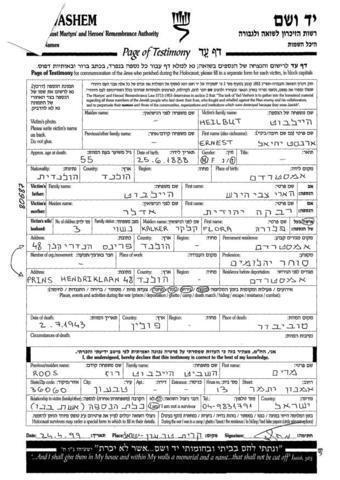Nimetz-Feder-Flash BIG Family Tree » Rebecca Judith Adler (1865-1890)
Personal data Rebecca Judith Adler
Source 1- She was born on February 23, 1865 in London, Middlesex, England, United Kingdom.
- Resident in the year 1881: Hove, Sussex, England.
- She died in the year 1890 in Amsterdam, Government of Amsterdam, Noord-Holland, The Netherlands, she was 24 years old.
- A child of Rabbi Dr Nathan Adler and הנרייטה Worms
Household of Rebecca Judith Adler
She has/had a relationship with Harry Heilbut.
Child(ren):
- Otto Nathan Heilbut 1890-1969
Timeline Rebecca Judith Adler
This functionality is only available in Javascript supporting browsers.
Click on the names for more info.
Symbols used:  grandparents
grandparents
 parents
parents
 brothers/sisters
brothers/sisters
 children
children
 grandparents
grandparents
 parents
parents
 brothers/sisters
brothers/sisters
 children
children
Ancestors (and descendant) of Rebecca Judith Adler
Rebecca Judith Adler | |||||||||||||||||||||||||||||||||||
Harry Heilbut | |||||||||||||||||||||||||||||||||||
Sources
- Hadar Nimetz's Family Tree Web Site, הדר נימץ, via https://www.myheritage.co.il/person-1500...
התווסף על ידי אישור התאמה חכמה
אילן יוחסין MyHeritage
אתר משפחתי: Hadar Nimetz's Family Tree Web Site
אילן יוחסין: 187131642-1
Historical events
Birthday February 23, 1865
- The temperature on February 23, 1865 was about 2.8 °C. There was 0.1 mm of rain. The air pressure was 0.5 kgf/m2 and came mainly from the south-southwest. The airpressure was 77 cm mercury. The atmospheric humidity was 100%. Source: KNMI
- Koning Willem III (Huis van Oranje-Nassau) was from 1849 till 1890 sovereign of the Netherlands (also known as Koninkrijk der Nederlanden)
- In The Netherlands , there was from February 1, 1862 to February 10, 1866 the cabinet Thorbecke II, with Mr. J.R. Thorbecke (liberaal) as prime minister.
- In the year 1865: Source: Wikipedia
- The Netherlands had about 3.6 million citizens.
- April 3 » American Civil War: Union forces capture Richmond, Virginia, the capital of the Confederate States of America.
- April 9 » American Civil War: Robert E. Lee surrenders the Army of Northern Virginia (26,765 troops) to Ulysses S. Grant at Appomattox Court House, Virginia, effectively ending the war.
- April 10 » American Civil War: A day after his surrender to Union forces, Confederate General Robert E. Lee addresses his troops for the last time.
- May 9 » American Civil War: President Andrew Johnson issues a proclamation ending belligerent rights of the rebels and enjoining foreign nations to intern or expel Confederate ships.
- December 2 » Alabama ratifies 13th Amendment to the U.S. Constitution, followed by North Carolina then Georgia, and U.S. slaves were legally free within two weeks
- December 17 » First performance of the Unfinished Symphony by Franz Schubert.
Same birth/death day
- 1850 » César Ritz, Swiss businessman, founded The Ritz Hotel, London and Hôtel Ritz Paris († 1918)
- 1868 » Anna Hofman-Uddgren, Swedish actress, singer, and director († 1947)
- 1868 » W. E. B. Du Bois, American sociologist, historian, and activist († 1963)
- 1873 » Liang Qichao, Chinese journalist, philosopher, and scholar († 1929)
- 1874 » Konstantin Päts, Estonian lawyer and politician, 1st President of Estonia († 1956)
- 1878 » Kazimir Malevich, Ukrainian painter and theorist († 1935)
About the surname Adler
- View the information that Genealogie Online has about the surname Adler.
- Check the information Open Archives has about Adler.
- Check the Wie (onder)zoekt wie? register to see who is (re)searching Adler.
The Nimetz-Feder-Flash BIG Family Tree publication was prepared by Hadar Nimitz (Nimetz Niemiec).
When copying data from this family tree, please include a reference to the origin:
Hadar Nimitz (Nimetz Niemiec), "Nimetz-Feder-Flash BIG Family Tree", database, Genealogy Online (https://www.genealogieonline.nl/nimetz-feder-flash-big-family-tree/I503001.php : accessed May 3, 2025), "Rebecca Judith Adler (1865-1890)".
Hadar Nimitz (Nimetz Niemiec), "Nimetz-Feder-Flash BIG Family Tree", database, Genealogy Online (https://www.genealogieonline.nl/nimetz-feder-flash-big-family-tree/I503001.php : accessed May 3, 2025), "Rebecca Judith Adler (1865-1890)".
